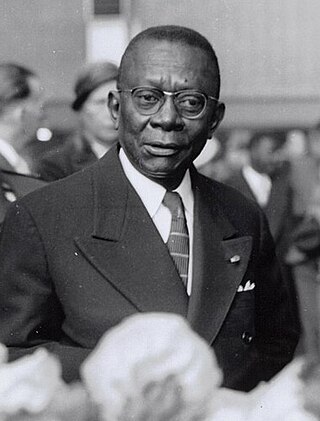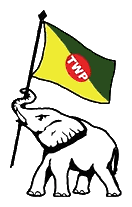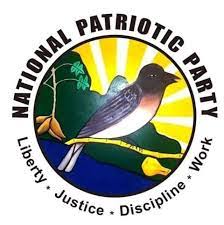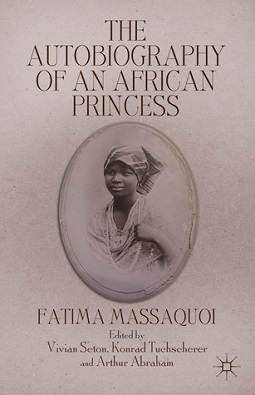
Liberia is a country in West Africa founded by free people of color from the United States. The emigration of African Americans, both freeborn and recently emancipated, was funded and organized by the American Colonization Society (ACS). The mortality rate of these settlers was the highest among settlements reported with modern recordkeeping. Of the 4,571 emigrants who arrived in Liberia between 1820 and 1843, only 1,819 survived (39.8%).

William Vacanarat Shadrach Tubman was a Liberian politician. He was the 19th president of Liberia and the longest-serving president in the country's history, serving from his election in 1944 until his death in 1971.

The True Whig Party (TWP), also known as the Liberian Whig Party (LWP), is the oldest political party in Liberia and one of the oldest parties in Africa. Founded in 1869 by primarily darker-skinned Americo-Liberians in rural areas, its historic rival was the Republican Party. Following the decline of the latter, it dominated Liberian politics from 1878 until 1980. The nation was virtually governed as a one-party state under the TWP, although opposition parties were never outlawed.

The National Patriotic Party (NPP) is a political party in Liberia. It was formed in 1997 by members of the National Patriotic Front of Liberia following the end of the First Liberian Civil War.

Charles Dunbar Burgess King was a Liberian politician who served as the 17th president of Liberia from 1920 to 1930. He was of Americo-Liberian and Sierra Leone Creole descent. He was a member of the True Whig Party, which ruled the country from 1878 until 1980.

Edwin James Barclay was a Liberian politician, poet, and musician who served as the 18th president of Liberia from 1930 until 1944. He was a member of the True Whig political party, which dominated the political governance of the country for decades. Under Barclay's leadership, Liberia was an ally of the United States during World War II.

Arthur Barclay was the 15th president of Liberia from 1904 to 1912.

General elections were held in Liberia on 11 October 2005, with a runoff election for the presidency held on 8 November. The presidency and all seats in the House of Representatives and Senate were up for election. The elections were the first held since 1997 and marked the end of the political transition following the second civil war, having been stipulated in the Accra Comprehensive Peace Agreement of 2004. Ellen Johnson Sirleaf, former World Bank employee and Liberian finance minister, won the presidential contest and became the first democratically elected female African head of state in January 2006.

Hans-Jürgen Massaquoi was a German-American journalist and author. He was born in Hamburg, Germany, to a German mother and a Liberian father of Vai ethnicity, the grandson of Momulu Massaquoi, the consul general of Liberia in Germany at the time.

The vice president of the Republic of Liberia is the second-highest executive official in Liberia, and one of only two elected executive offices along with the president. The vice president is elected on the same ticket with the president to a six-year term. In the event of the death, resignation or removal of the president, the vice president ascends to the presidency, and holds the position for the remainder of their predecessor's term. The vice president also serves as the president of the Senate and may cast a vote in the event of a tie. The current vice president is Jeremiah Koung, serving under president Joseph Boakai. He began his term on January 22, 2024.
Clennon Washington King Jr. was the second African-American man to run for the office of President of the United States after George Edwin Taylor, and whose attempts at civil rights actions and running for office as a perennial candidate caused him to be nicknamed "The Black Don Quixote."

General elections were held in Liberia in 1927. In the presidential election the result was a victory for Charles D. B. King of the True Whig Party, who was re-elected for a third term after defeating Thomas J. R. Faulkner of the People's Party.
Nathaniel Varney Massaquoi (1905–1962) was a Liberian educator and politician, from the Vai community.

Momulu Massaquoi (1869–1938) was a Liberian politician, diplomat, and monarch of the Vai people of Sierra Leone and Liberia. He served as Liberia's consul general to Germany 1922–1930, and appears to be the first indigenous African diplomat to modern Europe.

Fatima Massaquoi-Fahnbulleh was a Liberian writer and academic. After completing her education in the United States, she returned to Liberia in 1946, making significant contributions to the cultural and social life of the country.

The Autobiography of an African Princess, published in 2013, is an account of the early years (1912–1946) in the life of Fatima Massaquoi, a descendant of the royal families of the Gallinas from Sierra Leone and Liberia. It describes her early childhood in Africa, her schooling in Germany and Switzerland and her university studies in the United States.

Didwho Welleh Twe was a Liberian politician. He became a representative in the Liberian legislature and a presidential candidate in the 1951 Liberian general election. A review of his life shows that he was an advocate of Liberian native rights and the first Liberian of full tribal background to officially and openly seek the Liberian presidency. Since 1847, the country was ruled by descendants of American former Black slaves known as Americo-Liberians until 1980. The descendants constitute less than ten percent of the population.

After Liberian independence, Germany and Liberia become connected economically. The economic ties were broken during the World Wars. The two countries re-established connections following the World Wars.
Civitas Maxima is a non-governmental organisation that documents mass crimes, such as crimes against humanity, genocide, and war crimes, and pursues justice on behalf of the victims, particularly in West Africa.
Francois Eugene Massaquoi was a Liberian warlord and politician. Massaquoi led the Lofa Defense Force during the First Liberian Civil War, and later became a government minister. He died in 2001 under mysterious circumstances.

















